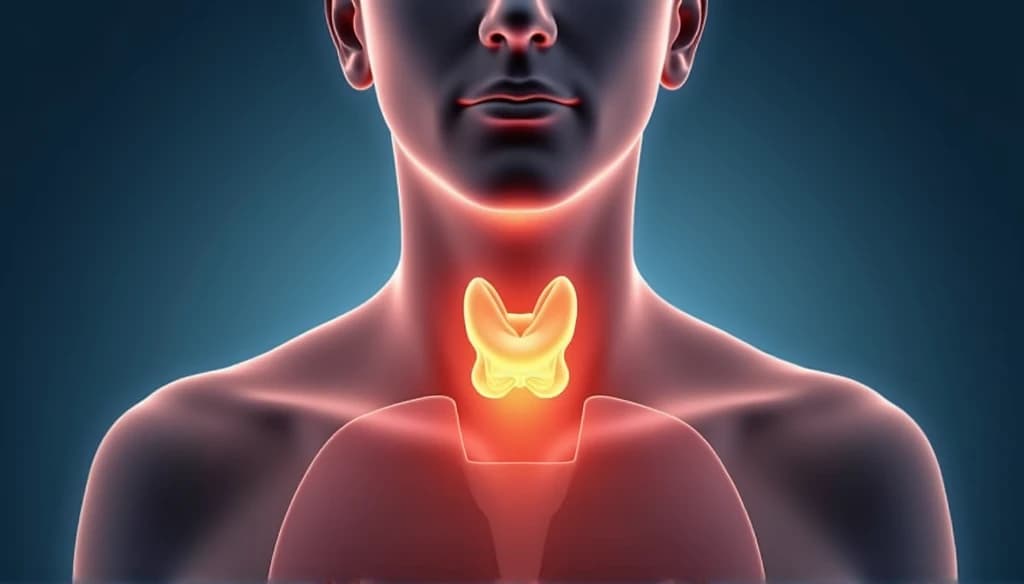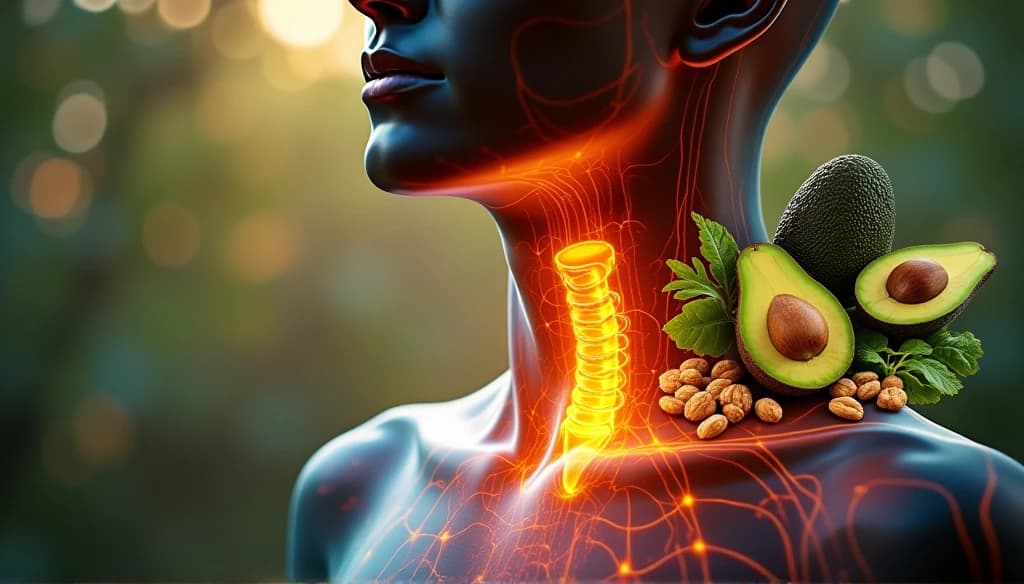Table of Contents
Toggle“I thought I was doing everything right: cutting carbs, increasing fats, and following the keto diet religiously. But instead of feeling energized, I was exhausted, cold, and depressed. Turns out, my thyroid took a hit.”
If this sounds familiar, you’re not alone. While the ketogenic (keto) diet has gained immense popularity for weight loss and managing conditions like diabetes, many have reported alarming side effects, including thyroid dysfunction.
In this article, we’ll explore how the keto diet may contribute to hypothyroidism (an underactive thyroid), the science behind it, warning signs, and actionable strategies to protect your thyroid health.
What Is the Keto Diet?
The ketogenic diet is a high-fat, low-carb diet that forces the body into a state of ketosis, where it burns fat for fuel instead of carbohydrates. This metabolic shift has been touted for its rapid weight loss effects, improved mental clarity, and potential benefits for epilepsy, diabetes, and other medical conditions.
The standard keto diet typically consists of:
- Fats: 70-80% of daily calories
- Protein: 10-20%
- Carbohydrates: 5-10%
While these ratios can vary, the drastic reduction in carbs poses unique challenges to the thyroid gland, which relies heavily on certain nutrients and hormonal balance.
Understanding Hypothyroidism

Hypothyroidism occurs when the thyroid gland, located in the neck, produces insufficient amounts of thyroid hormones—T3 (triiodothyronine) and T4 (thyroxine). These hormones regulate metabolism, energy production, and overall bodily functions.
Common Symptoms of Hypothyroidism:
- Fatigue and sluggishness
- Unexplained weight gain
- Cold sensitivity
- Hair thinning or hair loss
- Depression or brain fog
- Dry skin
- Constipation
The Link Between Keto and Hypothyroidism

While the keto diet works wonders for many, it can inadvertently disrupt thyroid function in certain individuals. Here’s how:
1. Low-Carb Diets Reduce T3 Hormone Levels
The thyroid gland converts T4 into T3, the active thyroid hormone. Studies suggest that low-carb diets like keto can reduce T3 levels, leading to symptoms of hypothyroidism.
2. Stress on the Body
Switching to keto can be perceived as a stressor by the body. This triggers the release of cortisol (stress hormone), which, when elevated, suppresses thyroid function.
3. Calorie Restriction
Many people inadvertently eat fewer calories on keto due to its appetite-suppressing effects. Chronic calorie restriction can slow metabolism and impair thyroid function.
4. Nutrient Deficiencies
The thyroid requires certain nutrients—like iodine, selenium, and zinc—to function optimally. A poorly planned keto diet may lack these nutrients, further impairing thyroid health.
5. Hormonal Imbalances
Thyroid hormones closely interact with other hormones like insulin and leptin. The drastic dietary changes on keto can disrupt this delicate balance, especially in women.
Symptoms of Thyroid Dysfunction on Keto

If you’re following the keto diet and experiencing the following symptoms, it could be a sign of thyroid dysfunction:
- Persistent fatigue despite being in ketosis
- Weight gain or inability to lose weight, even with strict keto adherence
- Feeling cold, especially in extremities (hands and feet)
- Hair thinning or shedding
- Depression or lack of motivation
- Constipation or digestive issues
Scientific Evidence: Keto and Thyroid Function
Let’s examine what research says about the relationship between keto and thyroid health:
| Study | Findings |
|---|---|
| A 2006 study on low-carb diets | Found a reduction in T3 levels, though TSH (thyroid-stimulating hormone) remained normal. |
| A 2015 study on calorie restriction | Demonstrated that prolonged calorie deficits lowered thyroid hormone production. |
| A 2021 review on keto diets | Highlighted nutrient deficiencies (iodine, selenium) as potential risks for thyroid health. |
While research is ongoing, it’s clear that low-carb diets like keto can impact thyroid function, particularly in susceptible individuals.
Who Is at Risk?

Certain groups may be more vulnerable to thyroid dysfunction on the keto diet:
- Women: Especially during pregnancy, postpartum, or menopause when hormones fluctuate.
- Individuals with a history of thyroid issues: Pre-existing hypothyroidism or Hashimoto’s thyroiditis.
- People with nutrient deficiencies: Low levels of iodine, selenium, or zinc.
- Chronic dieters: Those who frequently restrict calories or carbs.
How to Protect Your Thyroid on Keto

If you’re committed to staying on keto but want to safeguard your thyroid, try these strategies:
1. Incorporate Carb Cycling
Introduce periodic “carb-up” days to restore T3 levels and reduce stress on your body.
2. Focus on Nutrient-Dense Foods
Ensure your keto diet includes thyroid-supportive nutrients:
- Iodine: Found in seaweed, fish, and iodized salt.
- Selenium: Found in Brazil nuts, eggs, and mushrooms.
- Zinc: Found in beef, shellfish, and pumpkin seeds.
3. Avoid Extreme Calorie Restriction
Eat enough calories to support your basal metabolic rate (BMR).
4. Manage Stress
Incorporate stress-reducing practices like yoga, meditation, or light exercise.
5. Work with a Healthcare Provider
Monitor your thyroid levels (TSH, T3, T4) regularly and make adjustments as needed.
Comparative Table: Keto Diet vs. Thyroid Health
| Factor | Keto Diet | Thyroid Health |
|---|---|---|
| Carb Intake | < 50g/day | Requires moderate carbs for T3 levels |
| Calorie Restriction | Often reduced | Needs adequate calories for metabolism |
| Key Nutrients | May lack iodine, selenium, zinc | Relies on these nutrients for function |
| Hormonal Balance | Can disrupt cortisol and insulin levels | Requires hormonal stability |
Conclusion
The keto diet offers many benefits, but it’s not without risks—especially for thyroid health. While some thrive on keto, others may experience symptoms of hypothyroidism due to low T3 levels, nutrient deficiencies, or hormonal imbalances.
If you suspect keto has impacted your thyroid, don’t panic. Simple adjustments like carb cycling, eating nutrient-dense foods, and monitoring thyroid function can help restore balance. Always consult a healthcare provider before making significant dietary changes.
Your health is unique, and the best diet is one that supports your overall well-being—not just weight loss goals.
By understanding the potential risks and making informed choices, you can enjoy the benefits of keto without compromising your thyroid health.
FAQs About Keto and Hypothyroidism
Can keto cause hypothyroidism?
Keto itself doesn’t directly cause hypothyroidism, but it can trigger thyroid dysfunction in some individuals due to low carbs, calorie restriction, or nutrient deficiencies.
How can I tell if my thyroid is affected by keto?
Look out for symptoms like fatigue, cold sensitivity, weight gain, and hair thinning. Blood tests for TSH, T3, and T4 can confirm thyroid function.
Should I stop keto if I have hypothyroidism?
Not necessarily. You can modify your approach by incorporating more carbs, avoiding calorie restriction, and focusing on nutrient-rich foods.
Does keto benefit any thyroid conditions?
Some research suggests keto may benefit autoimmune thyroid conditions like Hashimoto’s by reducing inflammation. However, it may not be suitable for everyone.
How many carbs should I eat to support my thyroid?
A moderate carb intake (100-150g/day) may be more supportive for thyroid health than strict keto.





